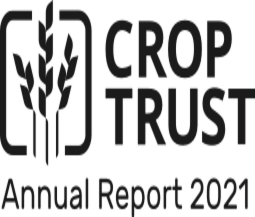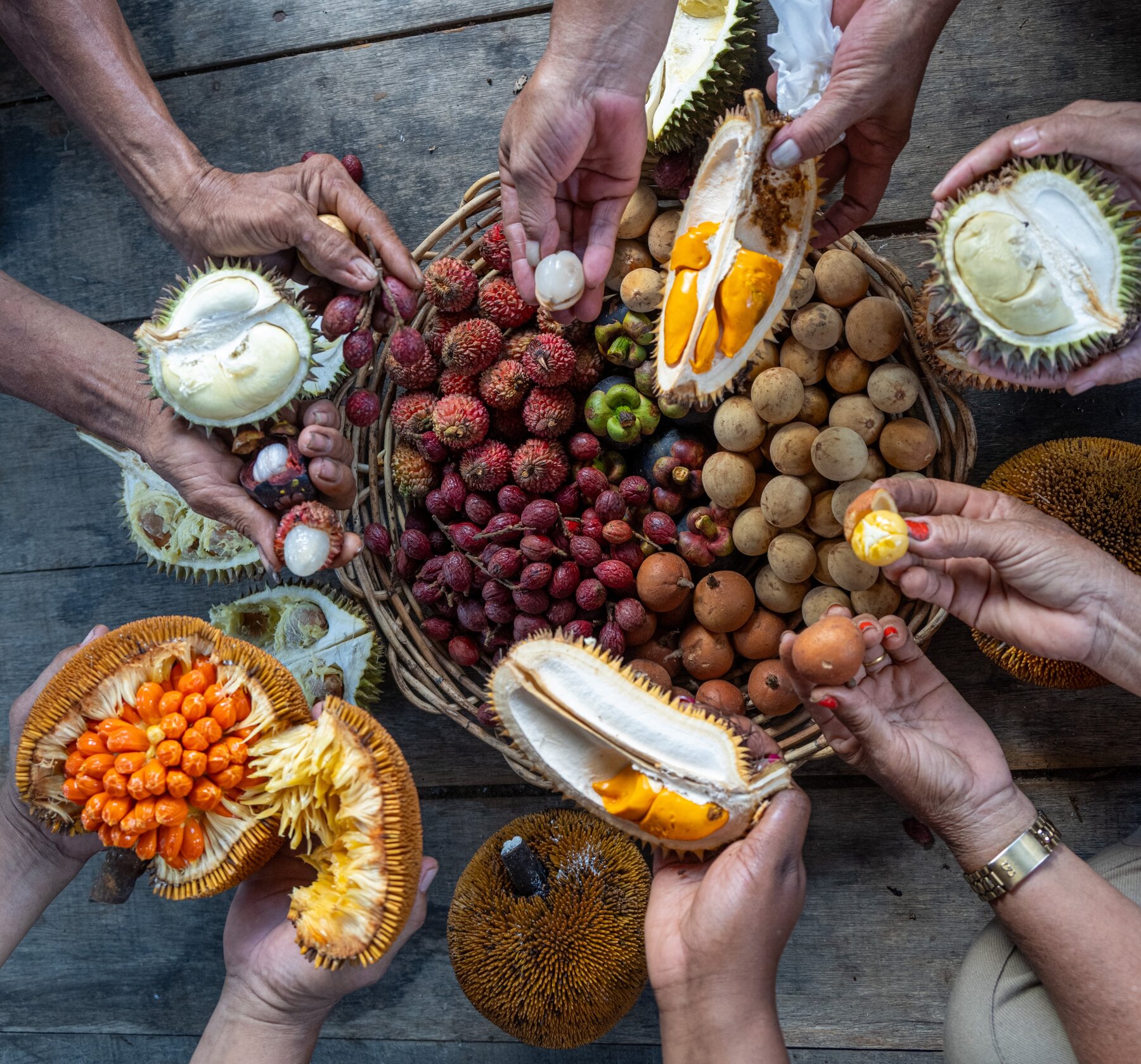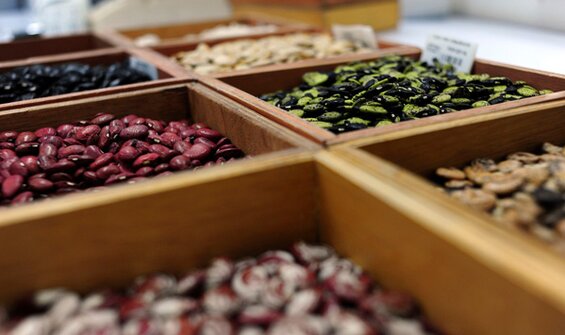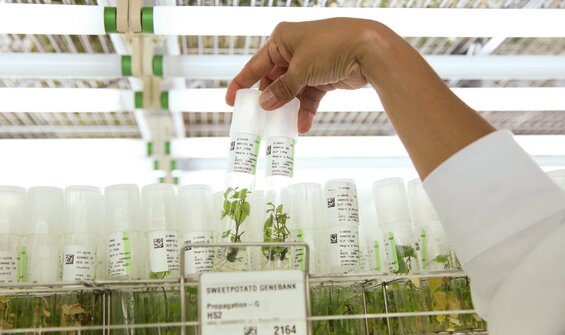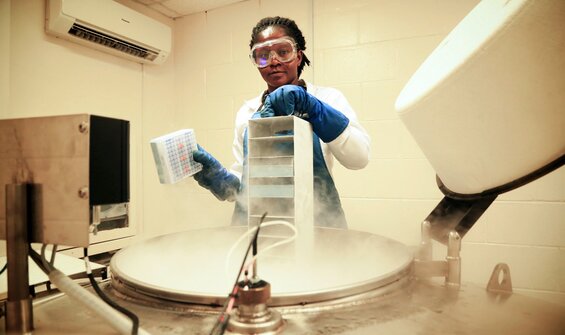Strategic Action Towards 2030
The year 2024 marked the first full year during which the Crop Trust was guided by the 2030 Strategic Plan: Food Forever. The Strategic Plan was put in place to achieve the organization’s vision of a world in which crop diversity is securely conserved for the long term and used to transform agrifood systems to be more sustainable, resilient and healthy.
Central to this vision is an effective global system of genebanks that secures millions of accessions of crop diversity, makes them available to each other and enables use by farmers, researchers and plant breeders to feed the world sustainably, forever.
In 2024, our work aligned with the goals set out in the Strategic Plan.
Goal 1
Long-term Support for the Maintenance of Essential Genebank Operations
This goal is focused on permanently covering the costs of essential operations of all international genebanks recognized under Article 15 of the International Treaty on Plant Genetic Resources for Food and Agriculture (International Plant Treaty) by 2030. Our work in this area depends on our Endowment Fund, a sustainable, long-term financing mechanism designed to support the vital work of genebanks. The value of the Endowment Fund increased from USD 305 million in 2024 to USD 357 million.
Read more
During the year, the Crop Trust continued its ongoing support for Article 15 genebanks through long-term partnership agreements (LPAs) with the International Rice Research Institute (IRRI), the International Center for Tropical Agriculture (The Alliance of Bioversity International and CIAT) and the International Institute of Tropical Agriculture (IITA). In 2024, AfricaRice became eligible for an LPA, which will support its genebank starting in 2025. These agreements cover a major portion of the annual costs of the essential operations of the collections in question.
In 2024, the Crop Trust continued to support 15 international genebanks’ unique crop collections through long-term grants. These are designed to foster and support the genebanks’ efforts to meet performance targets that would trigger qualification for an LPA.
In 2024, the Crop Trust also continued to enhance data management in genebanks. GRIN-Global Community Edition (GGCE) is freely accessible, open-source software that enables genebanks to optimize their internal genebank data management. Genesys is an online platform with information on millions of accessions from hundreds of genebanks. The Endowment Fund supports the development of both platforms to connect the network of genebanks digitally through data.
Goal 2
Time-bound Support for the Upgrading, Collecting and Use of Crop Diversity
The Crop Trust also provides project support for upgrading genebank facilities, conserving threatened crop diversity in genebanks and enhancing the availability of crop diversity. Thanks to the contributions by our generous donors, we continued implementing key projects:
Read more
- Seeds for Resilience, a project that supports national genebanks in African countries, made sound progress by planning infrastructure upgrades, providing specialized training, and implementing GGCE to improve operations and safety duplication of seed collections, including almost 1,500 accessions sent to the Svalbard Global Seed Vault in 2024.
- The Sweetpotato Project continued to multiply samples of this important crop in Madagascar and Zambia and provided almost 70,000 clean vines of diverse landraces to farmers in those countries. Farmers report good yields from the project’s vines, even in areas of extreme drought. Sixty-four landraces from partner countries were sent to the International Potato Center (CIP) in Lima for long-term storage, more than double the project’s target.
- The 10-year Biodiversity for Opportunities, Livelihoods and Development (BOLD) project, which began in 2021, forged ahead with capacity development of national genebanks in developing countries. A research program led by the Norwegian University of Life Sciences (NMBU) explored how to make crop diversity more readily accessible to farmers by ensuring that genebanks are better integrated in seed systems. Workshops in Uganda, Ecuador, Bhutan and Tanzania produced seed system assessment reports to inform pilot projects to strengthen linkages between genebanks and seed systems. BOLD partners deposited safety duplicates of their seed collections into the Svalbard Global Seed Vault.
- The BOLDER initiative, part of the BOLD project, ramped up with stakeholder consultations in four African countries to select nutritious, climate-resilient and environment-friendly opportunity crops for conservation and promotion.
- The Power of Diversity Funding Facility launched with a pilot project funded by the Governments of Germany and Ireland to tap the potential of opportunity crops in Africa, Asia, the Pacific and Latin America and the Caribbean.
Goal 3
Increasing Global Awareness of the Importance of Crop Diversity
Under this goal, the Crop Trust aims to increase global awareness of the importance of crop diversity. This includes efforts to deepen and broaden institutional partnerships and strategic communications and outreach that elevate crop diversity on the global development agenda.
Read more
In 2024, the Crop Trust provided thought leadership with global focus and co-hosted high-level engagement at events. We joined key partnership movements such as the Vision for Adapted Crops and Soils and added our voices to events in Germany, North Africa, the United States, the MENA region and more.
The Crop Diversity Day we organized with ICARDA in Rabat built on momentum from the 2023 Global Crop Diversity Summit. We launched the African Vegetable Biodiversity Rescue Plan with the World Vegetable Center at the 2024 Africa Food Systems Summit. People got a taste of the potential of opportunity crops at the Crop Trust’s Food Forever experiences in New York and Des Moines. We brought the message that crop diversity is food security to the Rio Convention conferences convened by the UN in Colombia and Saudi Arabia, and hosted a dialogue on Using Agricultural Innovation To Protect Biodiversity with the Financial Times and CGIAR. At the Borlaug Dialogue, our first two Executive Directors – Dr. Geoffrey Hawtin OBE and Dr. Cary Fowler – were recognized as 2024 World Food Prize Laureates, and we celebrated our 20th anniversary with friends, partners and staff at the storied Villa Hammerschmidt in Bonn, Germany in November.
Strategic communications amplified these efforts. Our Crop Chronicles campaign told the stories of BOLD-project crops – potato, barley, rice and others that feed the world – with podcasts, animations and engaging narratives. The Seed Heroes series inspired through the experiences of crop conservation champions such as Nikolai Vavilov, Evangelina Villegas, Otto Frankel, Melinda Smale and many more. We showcased our partners and put a spotlight on our projects with 136 stories on our website, videos, podcasts and other content. We opened multiple avenues to engage on crop diversity across platforms in a concerted effort to spark interest and raise awareness.
Moving Forward
Looking ahead, the 2030 Strategic Plan is more than just a foundation – it is a launchpad to accelerate and expand our efforts. With this plan in place, we aim to ensure that the crop diversity in genebanks plays a central role in addressing the urgent challenges facing humanity now and into the future.
